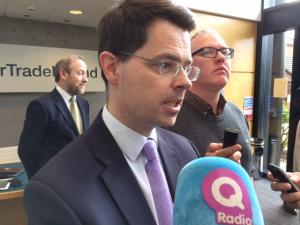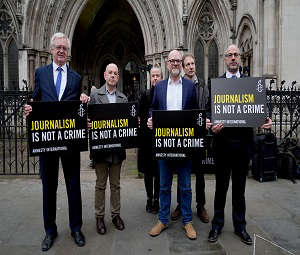
By David Young
The Northern Ireland Secretary is set to direct the allocation of some Stormont finances as the powersharing crisis drifts on.
Civil servants are currently in charge of departments, but a lack of an agreed budget act is restricting their ability to spend the region's allotted resources.
According to government sources, James Brokenshire is in discussions with the Treasury in regard to the redistribution of around £120 million of Northern Ireland's £10 billion block grant.
It is a step short of intervening to impose a formal budget.
If the Stormont crisis continues, Mr Brokenshire will face pressure to legislate for a Stormont budget at Westminster in the autumn.
The in-year reallocation of funds would usually fall to executive ministers.
But the bitter political rift between Stormont's two largest parties, the Democratic Unionists and Sinn Fein, has left the region without a first and deputy first minister since January and a functioning executive since March.
Civil servants currently only have access to 75% of the block grant. That will increase to 95% at the end of July. Only when a budget is passed will departments be able to spend the full Treasury allocation.
Health and education are expected to be among Mr Brokenshire's priorities when he distributes the money.
The Stormont deadlock is set to remain during the summer, as talks to restore the institutions have been scaled down amid widespread acknowledgement a deal before the autumn is unlikely.
While no formal suspension of the talks process has been called by the UK Government, and the main parties have signalled a willingness to continue some form of engagement over the coming weeks, substantive negotiations are not expected to resume in the short term.
Sinn Fein has blamed the failure to settle their differences on the DUP's parliamentary deal with the Prime Minister.
However, the DUP has claimed Sinn Fein's "excessive shopping list" of demands is preventing the formation of a new executive.
Sticking points include the shape of legislation to protect Irish language speakers, the DUP's opposition to lifting the region's ban on same-sex marriage, and mechanisms to deal with the legacy of the Troubles.
The devolved institutions imploded in January when Mrs Foster was forced from office after Sinn Fein's then deputy first minister, the late Martin McGuinness, quit.
That was in protest at the DUP's handling of the renewable heat incentive (RHI), a botched scheme that left the administration facing a £490 million overspend.
Mr McGuinness's move triggered March's snap Assembly poll and subsequent months of faltering negotiations to restore a devolved government.
The row over RHI exposed a series of other deep-seated divisions at the heart of the administration.


 Officer to be prosecuted for offence linked to Troubles memorial during pandemic
Officer to be prosecuted for offence linked to Troubles memorial during pandemic
 Pair appear before court charged with nurse’s murder
Pair appear before court charged with nurse’s murder
 Woman dies in West Belfast house fire
Woman dies in West Belfast house fire
 Eleanor Donaldson’s bid to have two charges withdrawn ‘should not delay trial’
Eleanor Donaldson’s bid to have two charges withdrawn ‘should not delay trial’
 Police surveillance operation to unmask journalistic source ruled unlawful
Police surveillance operation to unmask journalistic source ruled unlawful